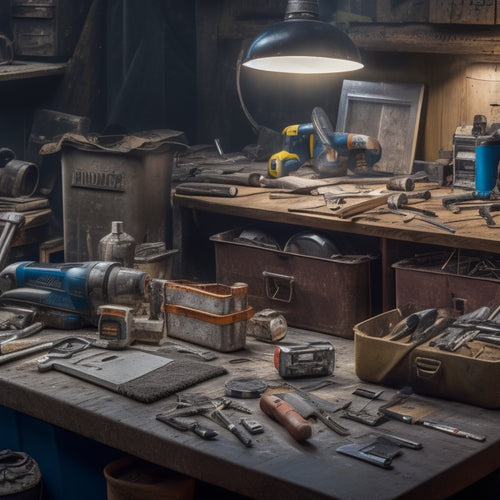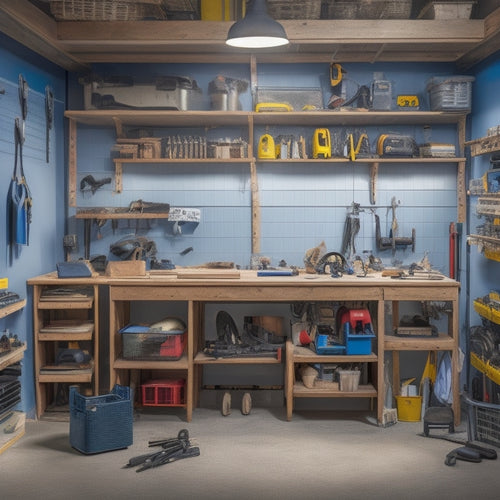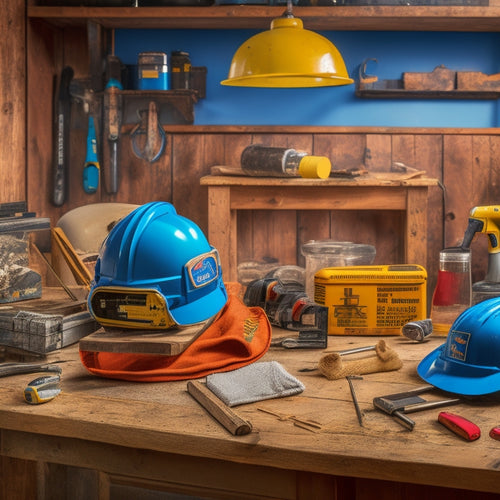
Top 3 Pointing Tools for Home Renovators
Share
When choosing a pointing tool for your home renovation project, you'll want to evaluate the specific material, area size, and your personal comfort and precision needs. For mortar, a pointing trowel is ideal, while a grout float is better suited for grout. The DEWALT Pointing Tool is a top-rated option, offering ergonomic design and comfort for extended use. The Makita Pointing Tool stands out for its exceptional accuracy, making it perfect for intricate tasks. By assessing your specific needs and exploring these top-rated tools, you'll be well on your way to finding the perfect fit for your project, and uncovering the details that will take your renovation to the next level.
Key Takeaways
• Consider ergonomic design and comfort features when selecting a pointing tool for extended use and reduced fatigue.
• Choose a tool suitable for your material type, such as a pointing trowel for mortar or a grout float for grout.
• Evaluate the area size and shape to determine the most suitable tool for the task, ensuring precision and efficiency.
• Research and test top-rated pointing tools, like DEWALT and Makita, to find the best fit for your specific needs and preferences.
• Prioritize features like precision control, dust resistance, and adjustable settings when selecting a pointing tool for optimal results.
Choosing the Right Pointing Tool
When selecting a pointing tool for your home renovation project, you need to reflect on the type of material you're working with, as different tools are designed to handle specific materials, such as mortar, concrete, or grout.
For instance, a pointing trowel is ideal for applying and smoothing mortar, while a grout float is better suited for grout applications. You'll also want to take into account the size and shape of the area you're working on, as well as the level of precision required.
Your personal preferences also play a role in choosing the right pointing tool. Do you prefer a tool with a comfortable grip or one with adjustable handles? Are you looking for a tool that's lightweight and easy to maneuver, or one that's more heavy-duty and durable?
There are various tool types to choose from, including manual and powered options, so it's important to weigh the pros and cons of each before making a decision. By taking these factors into account, you can select a pointing tool that meets your specific needs and helps you achieve professional-looking results.
Top-Rated Pointing Tools Compared
Comparing top-rated pointing tools side-by-side reveals significant differences in performance, durability, and usability, helping you make an informed decision for your specific home renovation needs.
You'll notice that some tools excel in precision, while others prioritize speed and efficiency. By examining pointing tool reviews, you'll get a sense of each tool's strengths and weaknesses. For instance, the DEWALT Pointing Tool is praised for its ergonomic design and comfortable grip, making it ideal for extended use. On the other hand, the Makita Pointing Tool stands out for its exceptional accuracy and versatility, making it a top choice for intricate work.
When evaluating these tools, consider your user experience. Do you prioritize ease of use or precision? Are you working on a large-scale project or a small, detailed task?
By weighing your needs against the strengths of each tool, you'll find the perfect fit. Remember, a top-rated pointing tool is only as good as its performance in your hands.
Take the time to research, compare, and test drive your options to guarantee you're investing in a tool that will help you achieve your renovation goals.
Features to Consider for Renovators
You'll want to evaluate the features of each pointing tool to verify they align with your renovation project's specific requirements, taking into account factors such as precision, speed, and ergonomics. When selecting a pointing tool, contemplate the durability factors that impact its performance and lifespan. A tool that withstands heavy use and harsh environments will save you time and money in the long run.
Here are key features to contemplate:
| Feature | Why It Matters |
|---|---|
| Ergonomic Design | Enhances user comfort, reducing fatigue and injury |
| Precision Control | Verifies accurate pointing and minimizes mistakes |
| Dust Resistance | Protects the tool from damage and prolongs its lifespan |
| Adjustable Settings | Allows for flexibility and adaptability to different materials |
| Weight and Balance | Affects user comfort and ease of use during extended periods |
Frequently Asked Questions
Can I Use a Pointing Tool for Grouting and Caulking as Well?
You can definitely use a pointing tool for grouting and caulking, but adjust your grouting techniques and follow precise caulking tips to guarantee a smooth, even application and avoid messes.
How Do I Clean and Maintain My Pointing Tool?
You'll extend your pointing tool's lifespan by following proper care and maintenance tips, such as regularly cleaning with soap and water, drying thoroughly, and storing in a protective case to prevent damage.
Are Pointing Tools Suitable for All Types of Mortar Joints?
You wonder if pointing tools are a one-size-fits-all solution, but reality checks in - not all tools are compatible with every mortar joint type, and you'll need to choose wisely to avoid damaging the joint or the tool itself.
Can Pointing Tools Be Used With Epoxy-Based Pointing Compounds?
You'll find that most pointing tools are compatible with epoxy-based pointing compounds, thanks to their versatility, allowing you to work efficiently with various materials, and giving you the freedom to choose the best epoxy for your project.
Are Pointing Tools Available for Left-Handed Users?
You'll be relieved to know that many pointing tools cater to left-handed users, offering ergonomic designs that adapt to your natural grip and motion, providing comfortable and precise control, regardless of your handedness.
Conclusion
You've got the lowdown on the top 3 pointing tools for home renovators.
Now, go forth and conquer those renovation projects like a 21st-century Leonardo da Vinci!
With the right tool in hand, you'll be precision-pointing like a pro in no time.
Remember, accuracy is key, so don't settle for anything less.
Get ready to transform your space with ease, and make those pointing tasks a breeze.
Related Posts
-

Smart Guide to Buying Second-Hand Renovation Tools
When buying second-hand renovation tools, you'll want to set clear renovation goals and a realistic budget to priorit...
-

Why Home Renovators Need Smart Tool Storage Now
You need a smart tool storage system that streamlines your workflow, reduces clutter, and protects your investments b...
-

Top 3 Safety Essentials for DIY Renovations
When tackling a DIY renovation, you'll want to prioritize three essential safety items to protect yourself from poten...


